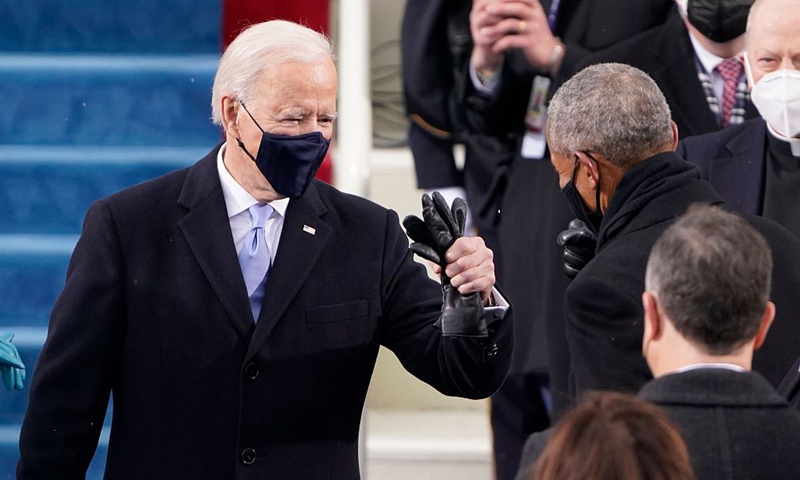
Joe Biden photo:VCG
Recently, the Washington DC-based Quincy Institute for Responsible Statecraft published a report titled, "A New Direction: A Foreign Policy Playbook on Military Restraint for the Biden Team." The core idea of the report suggests that the new administration of Joe Biden adopt a restrained strategy and not seek military supremacy in all places, including East Asia, at all costs.
From a certain sense, the stance of this report is a continuation of the Trump-era "America First." The difference is that it emphasizes that the US should give up regional hegemony and avoid risky military actions and instead use diplomatic and economic means to maintain US interests. Meanwhile, it pointed out that China is a challenger and an existential threat.
This policy paper aims to offer suggestions to the Biden administration, but it remains to be seen how much it will be adopted. Currently, there are certain three aspects about Biden's China policy. First, Biden has made it known that for agendas like the US' East China policy, it will discuss with its allies and heed the advice and interests of allies. From this perspective, the Quincy report suggests the US to drawdown military presence and put the well-being of the American people ahead of ambitions to dominate the globe, which is inconsistent with the thinking of the Biden administration. US allies in East Asia obviously want the US to continue its military and political presence in the region to counterbalance China.
Second, Secretary of State candidate Antony Blinken, Biden's CIA director pick William Burns, and Defense Secretary Lloyd J. Austin nominee all said that Trump's tough China policy was appropriate. But how will they implement tough China policies? It is highly unlikely the new administration will totally return to the past China engagement policy.
Third, the Biden administration is expected to cooperate with China on issues such as climate change and public health crises, and will not resort to the lose-lose trade war that Trump's reckless advisors such as Navarro pushed.
Therefore, suggestions in the report are generally congruent with Biden's policies to stress multilateralism, cooperate with allies, and avoid unnecessary risks and losses from confrontation. One prominent point was the suggestion of military restraint. It advised to reduce military tensions in the Taiwan Straits and negotiate maritime agreements with China, reduce its close-in surveillance near Chinese naval bases and operations near disputed islands and reefs, lower military tensions in the South China Sea, and restructure the US force posture in the region.
All in all, the report hopes that by showing a defensive posture, the US can reduce security risks in East Asia. If the suggestion can be accepted, it would be welcomed by China. Nonetheless, these moves mean the US leadership role in East Asia may be weakened or abandoned. So it is unknown if it will be adopted by the Biden administration and US allies. But stability and cooperation is worth trying. Because China and the US are now engaged in strategic competition, and mechanisms to manage this must be designed by both sides.
The rebalancing to Asia-Pacific strategy of the Obama administration and the Indo-Pacific Strategy endorsed by the Trump administration have the same essence - both aim at countering China's rise, with different means though. The China strategy of the Biden administration is unlikely to change fundamentally from the former Obama "pivot" strategy or certain elements set in motion under Trump.
This can be seen by observing bipartisan support to a slew of China-related bills in the US congress.
Biden's East Asia policy will focus on returning to multilateralism, strengthening ties with allies, and even returning to the Trans-Pacific Partnership (TPP). In the field of high technology, the Biden administration will not relax its suppression of China.
Biden is unlikely to reverse the Indo-Pacific Strategy either. After he won the election, he called for a "secure and prosperous" Indo-Pacific during a phone conversation with Japanese Prime Minister Yoshihide Suga. He has also appointed Kurt Campbell as, "Indo-Pacific Coordinator."
Biden believes Russia is an enemy and China is a competitor. What he means is that China is able to challenge US hegemony, while Russia is a declining foe. Therefore, one should not be overly optimistic about the future China-US ties.
The Biden administration's East Asia policy is expected to have two strategic pillars - strengthening the QUAD and enhancing cooperation with Southeast Asian countries; negotiating with members of the Japan-led CPTPP and resuming the original TPP. Compared with the clueless diplomacy of Trump, Biden's China policy may bring more profound and strategic challenges.
The author is a research fellow at the National Academy of Development and Strategy and professor at the School of International Studies, Renmin University of China. opinion@globaltimes.com.cn




